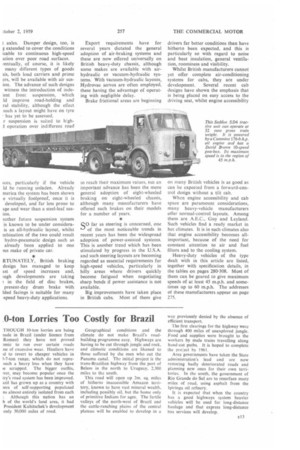.0-ton Lorries Too Costly for Brazil THOUGH 10-ton lorries are
Page 95

If you've noticed an error in this article please click here to report it so we can fix it.
being nade in Brazil (under licence from Romeo) they have not proved amie to run over certain roads ise of excessive wear. Hauliers have al to revert to cheaper vehicles in 5-7-ton range, which do not represuch a heavy Joss when they have le scrapped. The bigger outfits, :ver, may become popular once the try's road system has been improved. azil has grown up as a country with )ers of self-supporting populated ns almost entirely isolated from each
Although this nation has an h of the world's land area, it had President Kubitschek's development only 30,000 miles of road.
Geographical conditions and the climate do not make Brazil's roadbuilding programme easy. Highways are having to be cut through jungle and rock, and climatic conditions are likened to those suffered by the men who cut the Panama canal. The initial project is the trans-Brazilian highway from the port of Belem in the north to Uruguay, 2,500 miles to the south.
This road wilt open up 2m. sq. miles of hitherto inaccessible Amazon territory, known to have vast mineral wealth, including possibly oil, but the home only of primitive Indians for ages. The fertile valleys of the north-west of Brazil and the cattle-ranching plains of the central plateau will be enabled to develop in a
way previously denied by the absence of efficient transport.
The first clearings for the highway were through 400 miles of unexplored jungle. Food and supplies were brought to the workers by mule trains travelling along hand-cut paths. It is hoped to complete the project by 1961.
Area governments have taken the State administration's lead and are now restoring badly deteriorated roads and planning new ones for their own territories. In the south, the government of Rio Grande do Sul are to resurface many miles of road, using asphalt from the lpiringa oil refinery.
It is expected that when the country has a good highways system heavier vehicles will be used for long-distance haulage and that express long-distance bus services will develop.












































































































































































































































